University Accounting Theory Report: Commonwealth Bank Ethics
VerifiedAdded on 2022/08/27
|13
|2647
|20
Report
AI Summary
This report examines accounting theory in relation to business ethics, with a specific focus on the Commonwealth Bank (CBA) and its ethical dilemmas. The report begins by defining accounting theory and its impact on business culture, followed by an analysis of the ethical and cultural challenges faced by CBA, including issues related to financial planning misconduct and inadequate risk management. The report also incorporates various accounting theories such as standard setting, positive accounting theory, legitimacy theory, and stakeholder theory to understand the motivations of business managers. It references scholarly journal articles to support its arguments, exploring topics like cricket and banking ethics, reputation management in crises, and gambling practices. The report further discusses factors affecting business culture and ethics, including personal codes of conduct and communication, and concludes with recommendations based on its findings. The analysis also includes a review of CBA's corporate responsibilities, ethical dilemmas, and the findings of the Prudential Inquiry by APRA, offering insights into the bank's internal issues and their implications.
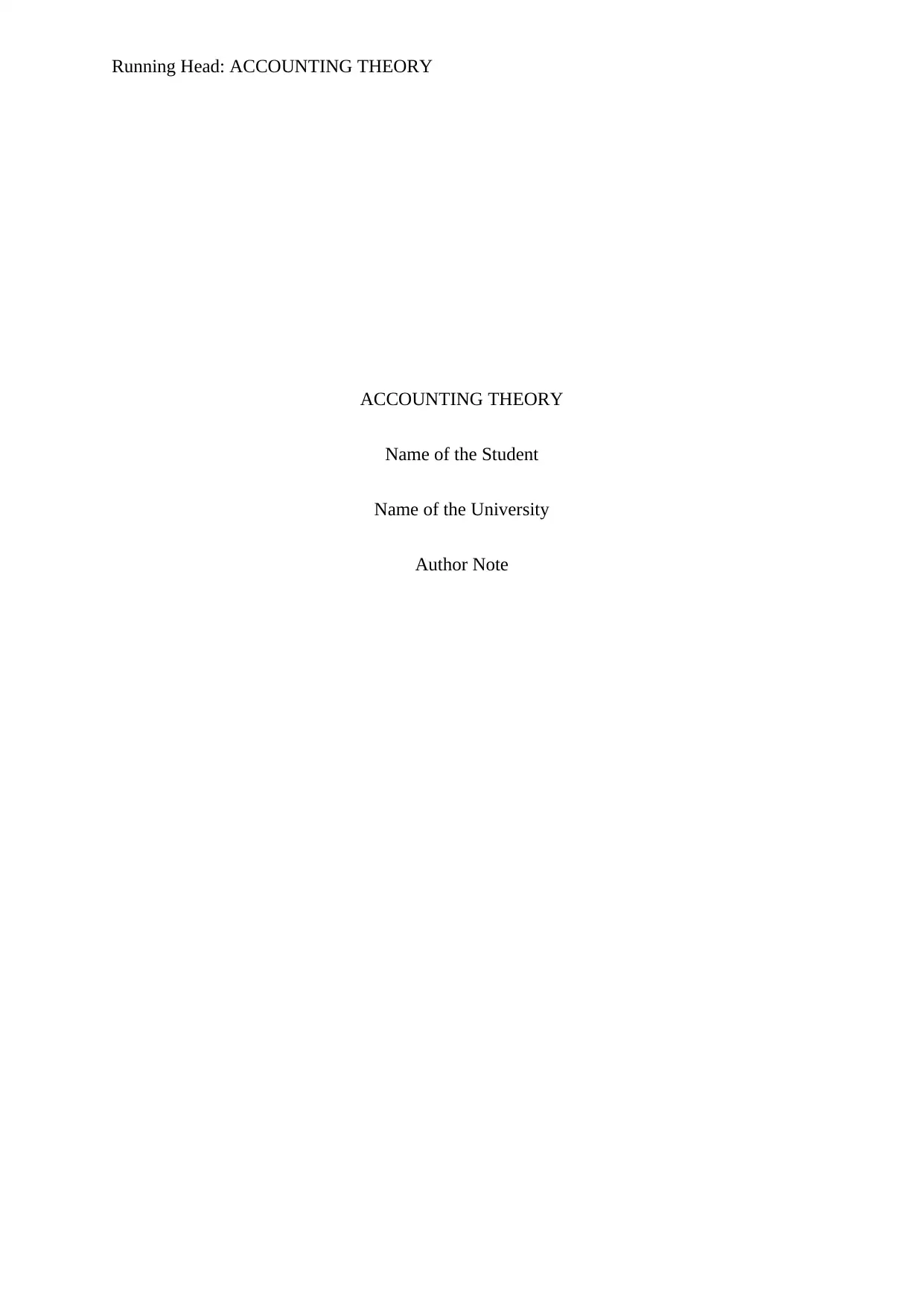
Running Head: ACCOUNTING THEORY
ACCOUNTING THEORY
Name of the Student
Name of the University
Author Note
ACCOUNTING THEORY
Name of the Student
Name of the University
Author Note
Paraphrase This Document
Need a fresh take? Get an instant paraphrase of this document with our AI Paraphraser
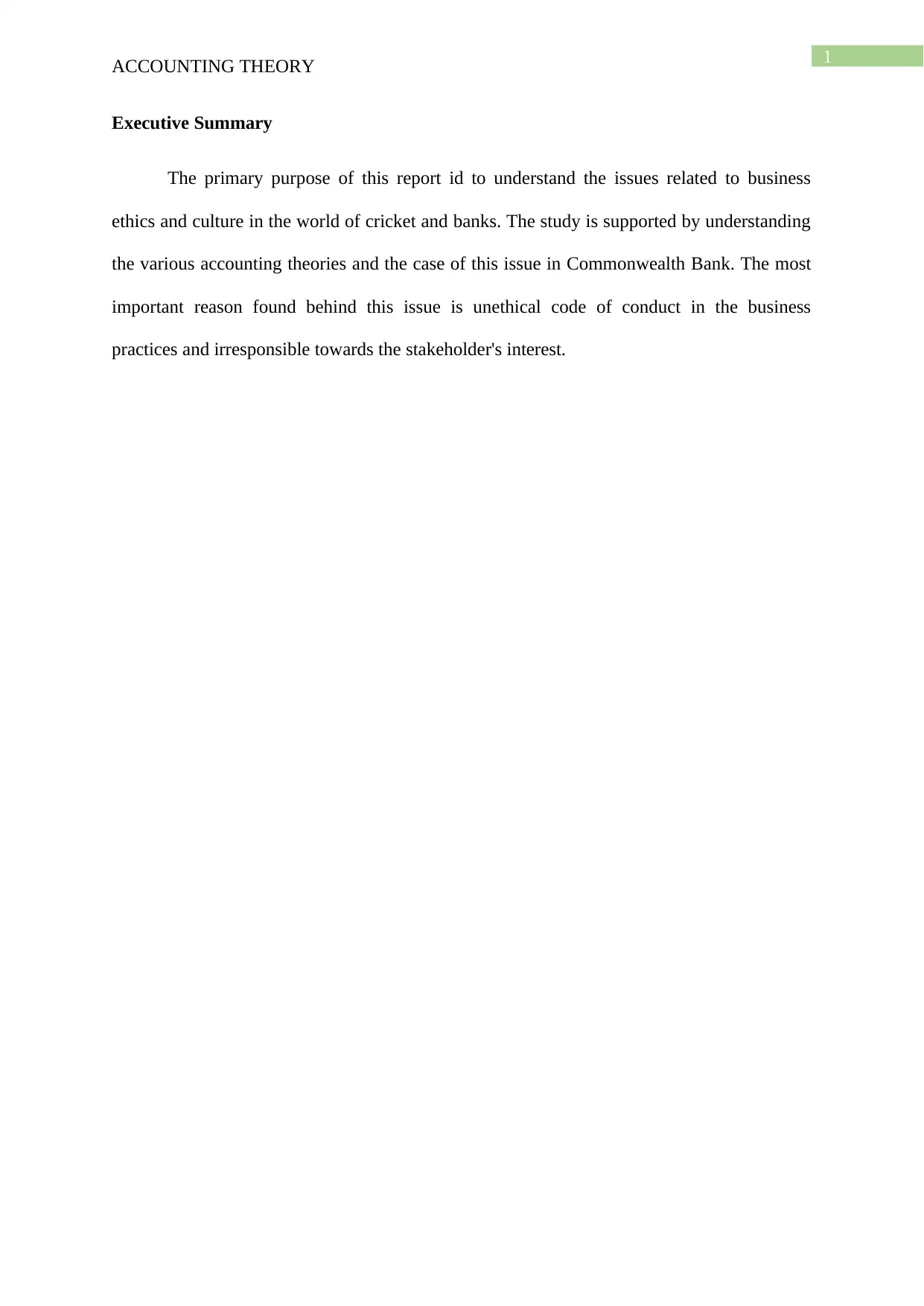
1
ACCOUNTING THEORY
Executive Summary
The primary purpose of this report id to understand the issues related to business
ethics and culture in the world of cricket and banks. The study is supported by understanding
the various accounting theories and the case of this issue in Commonwealth Bank. The most
important reason found behind this issue is unethical code of conduct in the business
practices and irresponsible towards the stakeholder's interest.
ACCOUNTING THEORY
Executive Summary
The primary purpose of this report id to understand the issues related to business
ethics and culture in the world of cricket and banks. The study is supported by understanding
the various accounting theories and the case of this issue in Commonwealth Bank. The most
important reason found behind this issue is unethical code of conduct in the business
practices and irresponsible towards the stakeholder's interest.
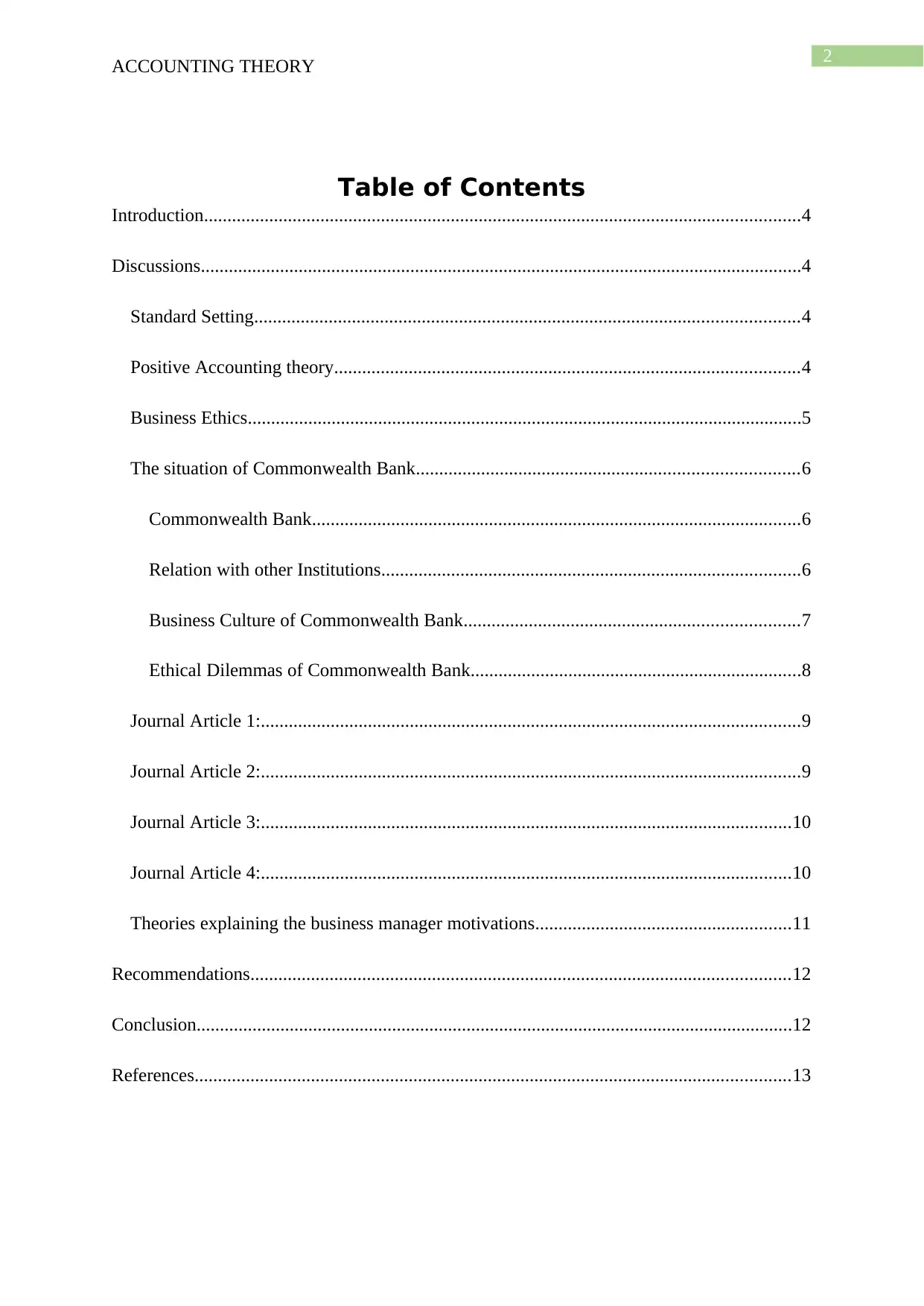
2
ACCOUNTING THEORY
Table of Contents
Introduction................................................................................................................................4
Discussions.................................................................................................................................4
Standard Setting.....................................................................................................................4
Positive Accounting theory....................................................................................................4
Business Ethics.......................................................................................................................5
The situation of Commonwealth Bank..................................................................................6
Commonwealth Bank.........................................................................................................6
Relation with other Institutions..........................................................................................6
Business Culture of Commonwealth Bank........................................................................7
Ethical Dilemmas of Commonwealth Bank.......................................................................8
Journal Article 1:....................................................................................................................9
Journal Article 2:....................................................................................................................9
Journal Article 3:..................................................................................................................10
Journal Article 4:..................................................................................................................10
Theories explaining the business manager motivations.......................................................11
Recommendations....................................................................................................................12
Conclusion................................................................................................................................12
References................................................................................................................................13
ACCOUNTING THEORY
Table of Contents
Introduction................................................................................................................................4
Discussions.................................................................................................................................4
Standard Setting.....................................................................................................................4
Positive Accounting theory....................................................................................................4
Business Ethics.......................................................................................................................5
The situation of Commonwealth Bank..................................................................................6
Commonwealth Bank.........................................................................................................6
Relation with other Institutions..........................................................................................6
Business Culture of Commonwealth Bank........................................................................7
Ethical Dilemmas of Commonwealth Bank.......................................................................8
Journal Article 1:....................................................................................................................9
Journal Article 2:....................................................................................................................9
Journal Article 3:..................................................................................................................10
Journal Article 4:..................................................................................................................10
Theories explaining the business manager motivations.......................................................11
Recommendations....................................................................................................................12
Conclusion................................................................................................................................12
References................................................................................................................................13
⊘ This is a preview!⊘
Do you want full access?
Subscribe today to unlock all pages.

Trusted by 1+ million students worldwide
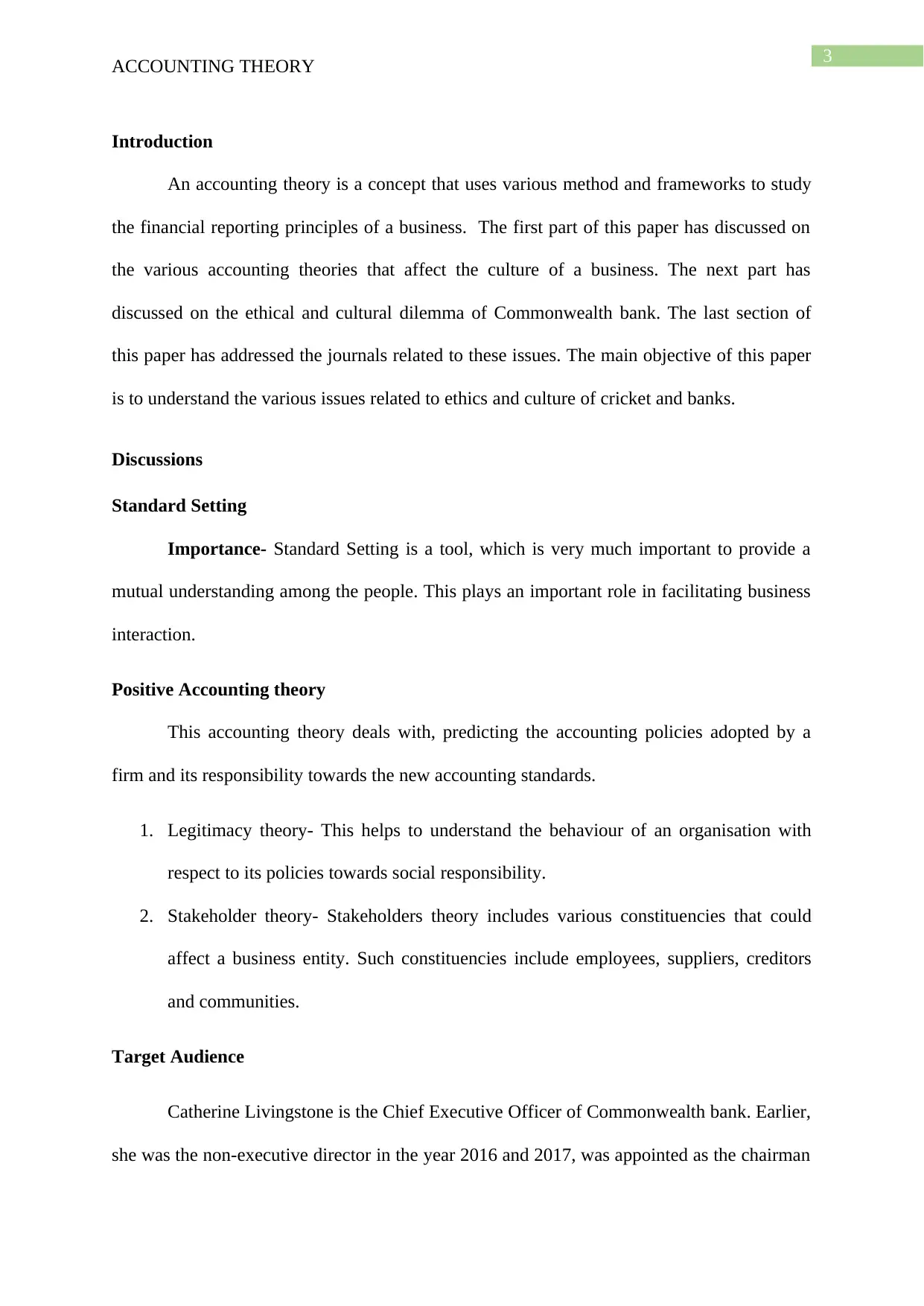
3
ACCOUNTING THEORY
Introduction
An accounting theory is a concept that uses various method and frameworks to study
the financial reporting principles of a business. The first part of this paper has discussed on
the various accounting theories that affect the culture of a business. The next part has
discussed on the ethical and cultural dilemma of Commonwealth bank. The last section of
this paper has addressed the journals related to these issues. The main objective of this paper
is to understand the various issues related to ethics and culture of cricket and banks.
Discussions
Standard Setting
Importance- Standard Setting is a tool, which is very much important to provide a
mutual understanding among the people. This plays an important role in facilitating business
interaction.
Positive Accounting theory
This accounting theory deals with, predicting the accounting policies adopted by a
firm and its responsibility towards the new accounting standards.
1. Legitimacy theory- This helps to understand the behaviour of an organisation with
respect to its policies towards social responsibility.
2. Stakeholder theory- Stakeholders theory includes various constituencies that could
affect a business entity. Such constituencies include employees, suppliers, creditors
and communities.
Target Audience
Catherine Livingstone is the Chief Executive Officer of Commonwealth bank. Earlier,
she was the non-executive director in the year 2016 and 2017, was appointed as the chairman
ACCOUNTING THEORY
Introduction
An accounting theory is a concept that uses various method and frameworks to study
the financial reporting principles of a business. The first part of this paper has discussed on
the various accounting theories that affect the culture of a business. The next part has
discussed on the ethical and cultural dilemma of Commonwealth bank. The last section of
this paper has addressed the journals related to these issues. The main objective of this paper
is to understand the various issues related to ethics and culture of cricket and banks.
Discussions
Standard Setting
Importance- Standard Setting is a tool, which is very much important to provide a
mutual understanding among the people. This plays an important role in facilitating business
interaction.
Positive Accounting theory
This accounting theory deals with, predicting the accounting policies adopted by a
firm and its responsibility towards the new accounting standards.
1. Legitimacy theory- This helps to understand the behaviour of an organisation with
respect to its policies towards social responsibility.
2. Stakeholder theory- Stakeholders theory includes various constituencies that could
affect a business entity. Such constituencies include employees, suppliers, creditors
and communities.
Target Audience
Catherine Livingstone is the Chief Executive Officer of Commonwealth bank. Earlier,
she was the non-executive director in the year 2016 and 2017, was appointed as the chairman
Paraphrase This Document
Need a fresh take? Get an instant paraphrase of this document with our AI Paraphraser
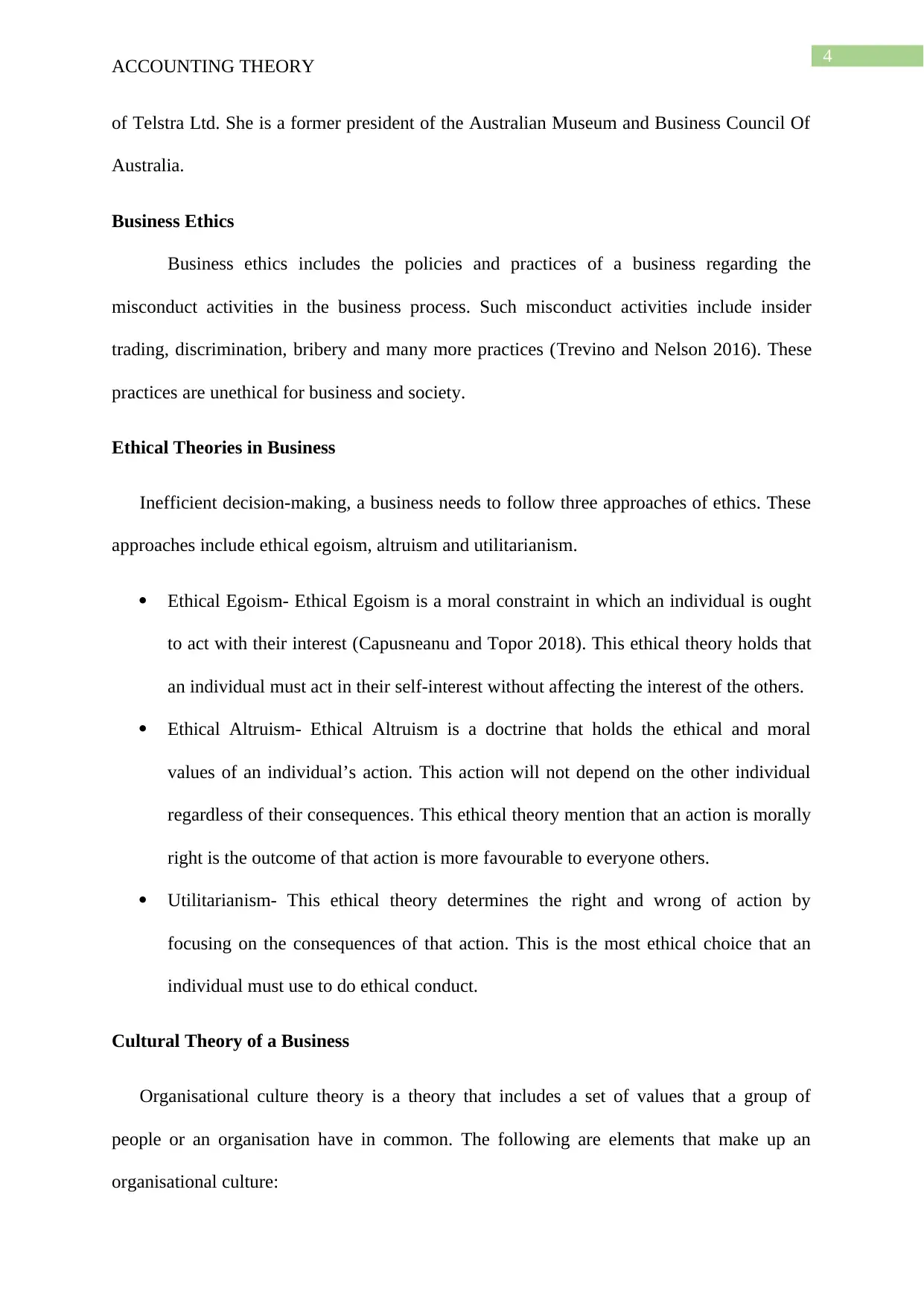
4
ACCOUNTING THEORY
of Telstra Ltd. She is a former president of the Australian Museum and Business Council Of
Australia.
Business Ethics
Business ethics includes the policies and practices of a business regarding the
misconduct activities in the business process. Such misconduct activities include insider
trading, discrimination, bribery and many more practices (Trevino and Nelson 2016). These
practices are unethical for business and society.
Ethical Theories in Business
Inefficient decision-making, a business needs to follow three approaches of ethics. These
approaches include ethical egoism, altruism and utilitarianism.
Ethical Egoism- Ethical Egoism is a moral constraint in which an individual is ought
to act with their interest (Capusneanu and Topor 2018). This ethical theory holds that
an individual must act in their self-interest without affecting the interest of the others.
Ethical Altruism- Ethical Altruism is a doctrine that holds the ethical and moral
values of an individual’s action. This action will not depend on the other individual
regardless of their consequences. This ethical theory mention that an action is morally
right is the outcome of that action is more favourable to everyone others.
Utilitarianism- This ethical theory determines the right and wrong of action by
focusing on the consequences of that action. This is the most ethical choice that an
individual must use to do ethical conduct.
Cultural Theory of a Business
Organisational culture theory is a theory that includes a set of values that a group of
people or an organisation have in common. The following are elements that make up an
organisational culture:
ACCOUNTING THEORY
of Telstra Ltd. She is a former president of the Australian Museum and Business Council Of
Australia.
Business Ethics
Business ethics includes the policies and practices of a business regarding the
misconduct activities in the business process. Such misconduct activities include insider
trading, discrimination, bribery and many more practices (Trevino and Nelson 2016). These
practices are unethical for business and society.
Ethical Theories in Business
Inefficient decision-making, a business needs to follow three approaches of ethics. These
approaches include ethical egoism, altruism and utilitarianism.
Ethical Egoism- Ethical Egoism is a moral constraint in which an individual is ought
to act with their interest (Capusneanu and Topor 2018). This ethical theory holds that
an individual must act in their self-interest without affecting the interest of the others.
Ethical Altruism- Ethical Altruism is a doctrine that holds the ethical and moral
values of an individual’s action. This action will not depend on the other individual
regardless of their consequences. This ethical theory mention that an action is morally
right is the outcome of that action is more favourable to everyone others.
Utilitarianism- This ethical theory determines the right and wrong of action by
focusing on the consequences of that action. This is the most ethical choice that an
individual must use to do ethical conduct.
Cultural Theory of a Business
Organisational culture theory is a theory that includes a set of values that a group of
people or an organisation have in common. The following are elements that make up an
organisational culture:
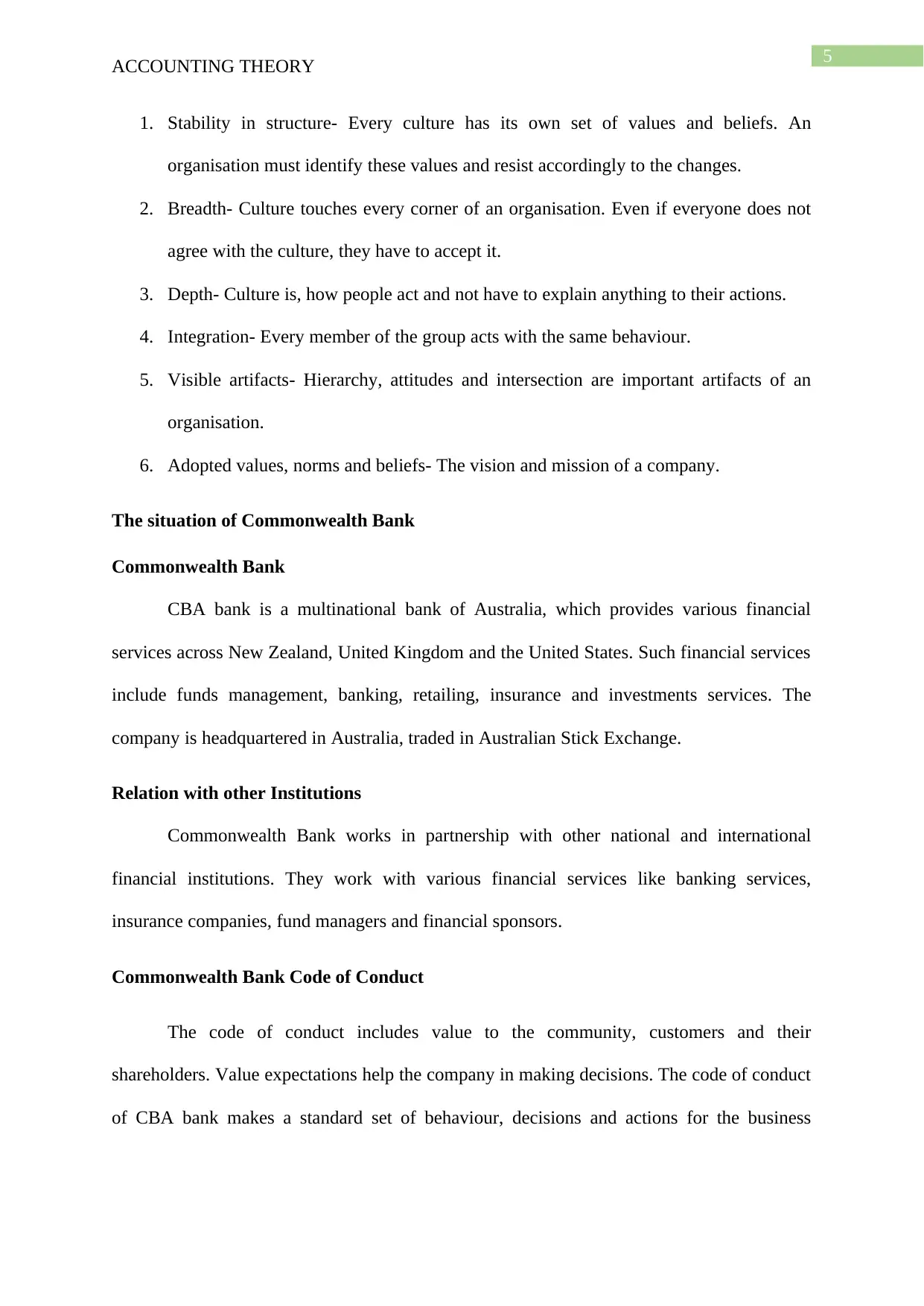
5
ACCOUNTING THEORY
1. Stability in structure- Every culture has its own set of values and beliefs. An
organisation must identify these values and resist accordingly to the changes.
2. Breadth- Culture touches every corner of an organisation. Even if everyone does not
agree with the culture, they have to accept it.
3. Depth- Culture is, how people act and not have to explain anything to their actions.
4. Integration- Every member of the group acts with the same behaviour.
5. Visible artifacts- Hierarchy, attitudes and intersection are important artifacts of an
organisation.
6. Adopted values, norms and beliefs- The vision and mission of a company.
The situation of Commonwealth Bank
Commonwealth Bank
CBA bank is a multinational bank of Australia, which provides various financial
services across New Zealand, United Kingdom and the United States. Such financial services
include funds management, banking, retailing, insurance and investments services. The
company is headquartered in Australia, traded in Australian Stick Exchange.
Relation with other Institutions
Commonwealth Bank works in partnership with other national and international
financial institutions. They work with various financial services like banking services,
insurance companies, fund managers and financial sponsors.
Commonwealth Bank Code of Conduct
The code of conduct includes value to the community, customers and their
shareholders. Value expectations help the company in making decisions. The code of conduct
of CBA bank makes a standard set of behaviour, decisions and actions for the business
ACCOUNTING THEORY
1. Stability in structure- Every culture has its own set of values and beliefs. An
organisation must identify these values and resist accordingly to the changes.
2. Breadth- Culture touches every corner of an organisation. Even if everyone does not
agree with the culture, they have to accept it.
3. Depth- Culture is, how people act and not have to explain anything to their actions.
4. Integration- Every member of the group acts with the same behaviour.
5. Visible artifacts- Hierarchy, attitudes and intersection are important artifacts of an
organisation.
6. Adopted values, norms and beliefs- The vision and mission of a company.
The situation of Commonwealth Bank
Commonwealth Bank
CBA bank is a multinational bank of Australia, which provides various financial
services across New Zealand, United Kingdom and the United States. Such financial services
include funds management, banking, retailing, insurance and investments services. The
company is headquartered in Australia, traded in Australian Stick Exchange.
Relation with other Institutions
Commonwealth Bank works in partnership with other national and international
financial institutions. They work with various financial services like banking services,
insurance companies, fund managers and financial sponsors.
Commonwealth Bank Code of Conduct
The code of conduct includes value to the community, customers and their
shareholders. Value expectations help the company in making decisions. The code of conduct
of CBA bank makes a standard set of behaviour, decisions and actions for the business
⊘ This is a preview!⊘
Do you want full access?
Subscribe today to unlock all pages.

Trusted by 1+ million students worldwide
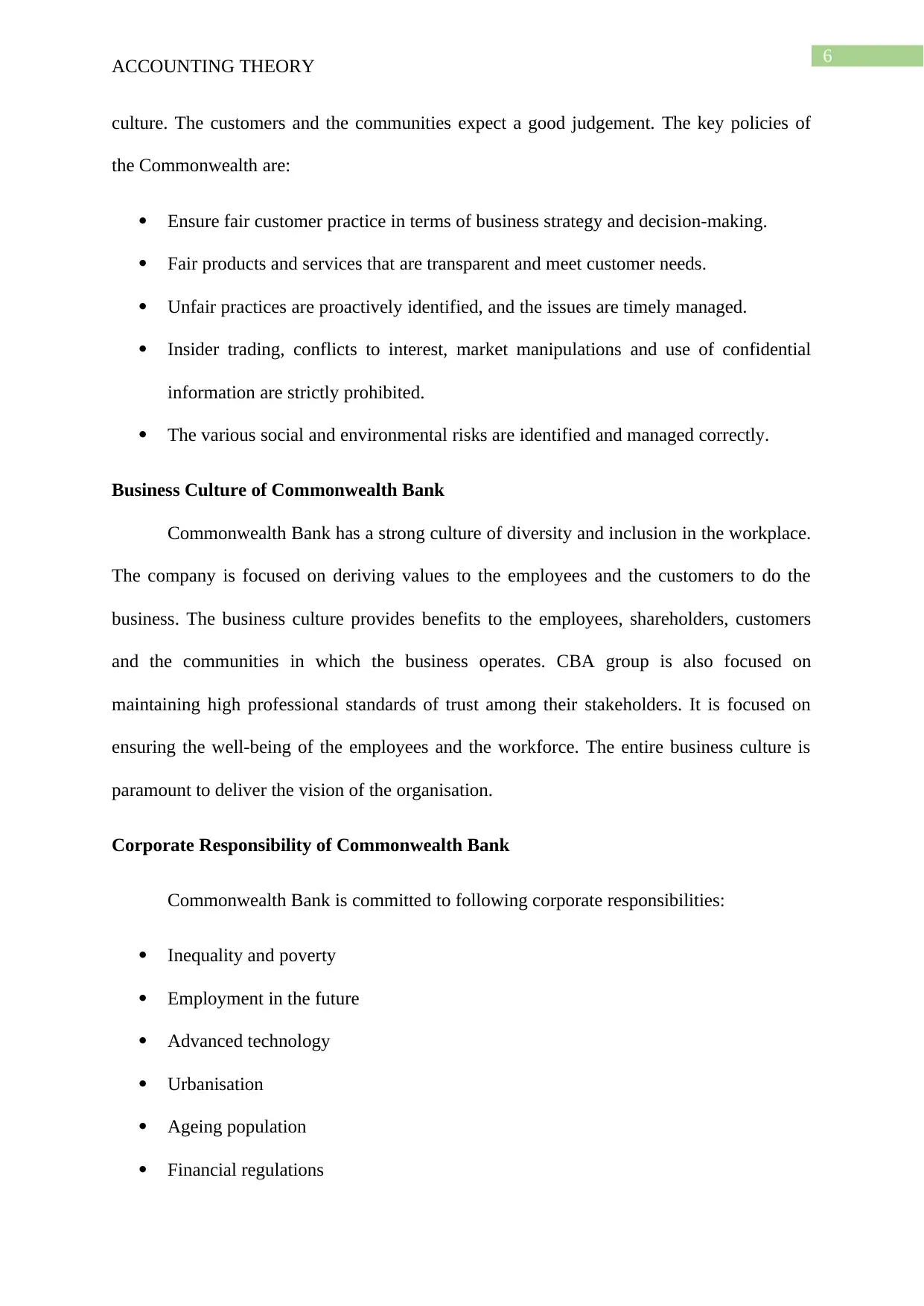
6
ACCOUNTING THEORY
culture. The customers and the communities expect a good judgement. The key policies of
the Commonwealth are:
Ensure fair customer practice in terms of business strategy and decision-making.
Fair products and services that are transparent and meet customer needs.
Unfair practices are proactively identified, and the issues are timely managed.
Insider trading, conflicts to interest, market manipulations and use of confidential
information are strictly prohibited.
The various social and environmental risks are identified and managed correctly.
Business Culture of Commonwealth Bank
Commonwealth Bank has a strong culture of diversity and inclusion in the workplace.
The company is focused on deriving values to the employees and the customers to do the
business. The business culture provides benefits to the employees, shareholders, customers
and the communities in which the business operates. CBA group is also focused on
maintaining high professional standards of trust among their stakeholders. It is focused on
ensuring the well-being of the employees and the workforce. The entire business culture is
paramount to deliver the vision of the organisation.
Corporate Responsibility of Commonwealth Bank
Commonwealth Bank is committed to following corporate responsibilities:
Inequality and poverty
Employment in the future
Advanced technology
Urbanisation
Ageing population
Financial regulations
ACCOUNTING THEORY
culture. The customers and the communities expect a good judgement. The key policies of
the Commonwealth are:
Ensure fair customer practice in terms of business strategy and decision-making.
Fair products and services that are transparent and meet customer needs.
Unfair practices are proactively identified, and the issues are timely managed.
Insider trading, conflicts to interest, market manipulations and use of confidential
information are strictly prohibited.
The various social and environmental risks are identified and managed correctly.
Business Culture of Commonwealth Bank
Commonwealth Bank has a strong culture of diversity and inclusion in the workplace.
The company is focused on deriving values to the employees and the customers to do the
business. The business culture provides benefits to the employees, shareholders, customers
and the communities in which the business operates. CBA group is also focused on
maintaining high professional standards of trust among their stakeholders. It is focused on
ensuring the well-being of the employees and the workforce. The entire business culture is
paramount to deliver the vision of the organisation.
Corporate Responsibility of Commonwealth Bank
Commonwealth Bank is committed to following corporate responsibilities:
Inequality and poverty
Employment in the future
Advanced technology
Urbanisation
Ageing population
Financial regulations
Paraphrase This Document
Need a fresh take? Get an instant paraphrase of this document with our AI Paraphraser
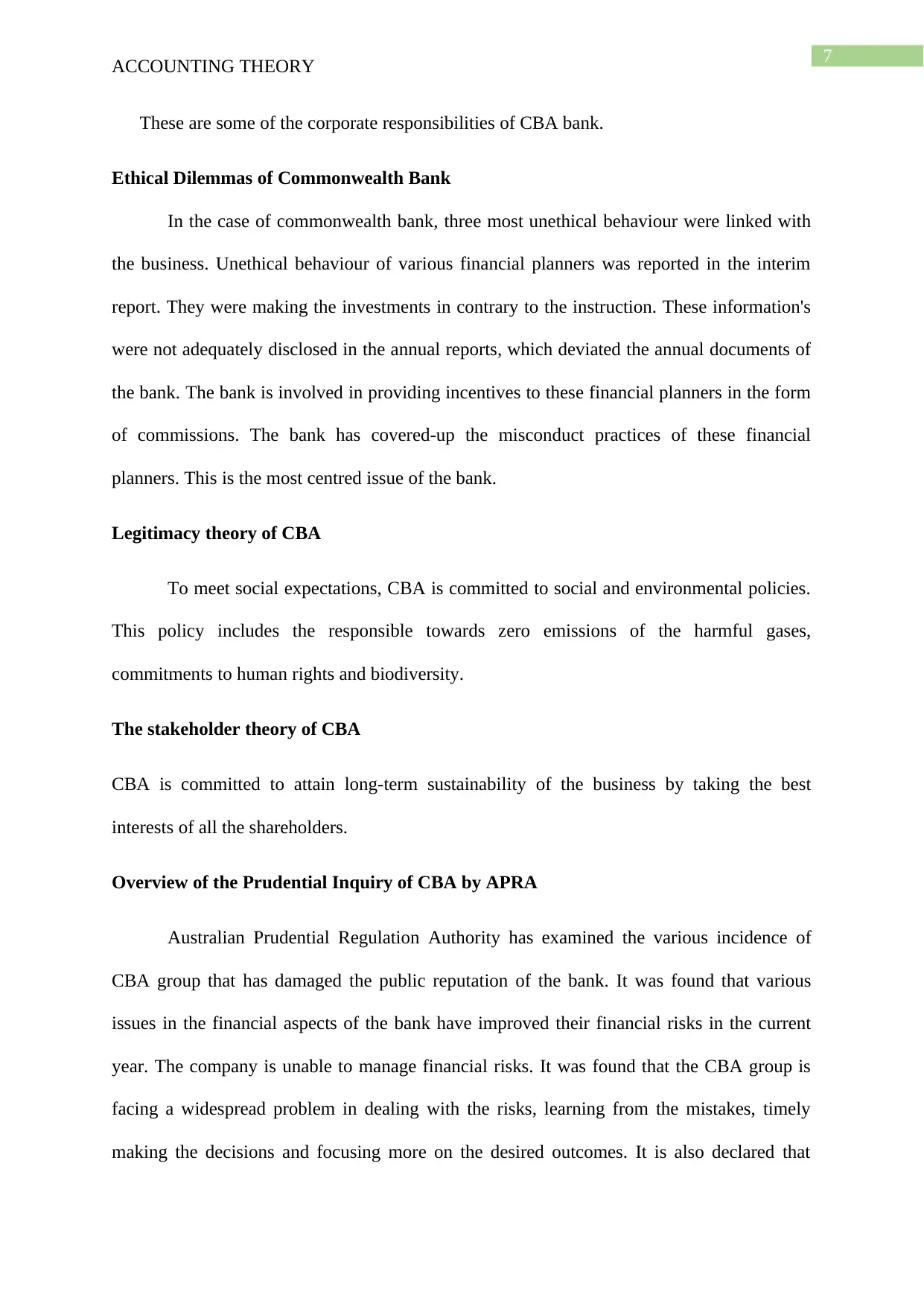
7
ACCOUNTING THEORY
These are some of the corporate responsibilities of CBA bank.
Ethical Dilemmas of Commonwealth Bank
In the case of commonwealth bank, three most unethical behaviour were linked with
the business. Unethical behaviour of various financial planners was reported in the interim
report. They were making the investments in contrary to the instruction. These information's
were not adequately disclosed in the annual reports, which deviated the annual documents of
the bank. The bank is involved in providing incentives to these financial planners in the form
of commissions. The bank has covered-up the misconduct practices of these financial
planners. This is the most centred issue of the bank.
Legitimacy theory of CBA
To meet social expectations, CBA is committed to social and environmental policies.
This policy includes the responsible towards zero emissions of the harmful gases,
commitments to human rights and biodiversity.
The stakeholder theory of CBA
CBA is committed to attain long-term sustainability of the business by taking the best
interests of all the shareholders.
Overview of the Prudential Inquiry of CBA by APRA
Australian Prudential Regulation Authority has examined the various incidence of
CBA group that has damaged the public reputation of the bank. It was found that various
issues in the financial aspects of the bank have improved their financial risks in the current
year. The company is unable to manage financial risks. It was found that the CBA group is
facing a widespread problem in dealing with the risks, learning from the mistakes, timely
making the decisions and focusing more on the desired outcomes. It is also declared that
ACCOUNTING THEORY
These are some of the corporate responsibilities of CBA bank.
Ethical Dilemmas of Commonwealth Bank
In the case of commonwealth bank, three most unethical behaviour were linked with
the business. Unethical behaviour of various financial planners was reported in the interim
report. They were making the investments in contrary to the instruction. These information's
were not adequately disclosed in the annual reports, which deviated the annual documents of
the bank. The bank is involved in providing incentives to these financial planners in the form
of commissions. The bank has covered-up the misconduct practices of these financial
planners. This is the most centred issue of the bank.
Legitimacy theory of CBA
To meet social expectations, CBA is committed to social and environmental policies.
This policy includes the responsible towards zero emissions of the harmful gases,
commitments to human rights and biodiversity.
The stakeholder theory of CBA
CBA is committed to attain long-term sustainability of the business by taking the best
interests of all the shareholders.
Overview of the Prudential Inquiry of CBA by APRA
Australian Prudential Regulation Authority has examined the various incidence of
CBA group that has damaged the public reputation of the bank. It was found that various
issues in the financial aspects of the bank have improved their financial risks in the current
year. The company is unable to manage financial risks. It was found that the CBA group is
facing a widespread problem in dealing with the risks, learning from the mistakes, timely
making the decisions and focusing more on the desired outcomes. It is also declared that
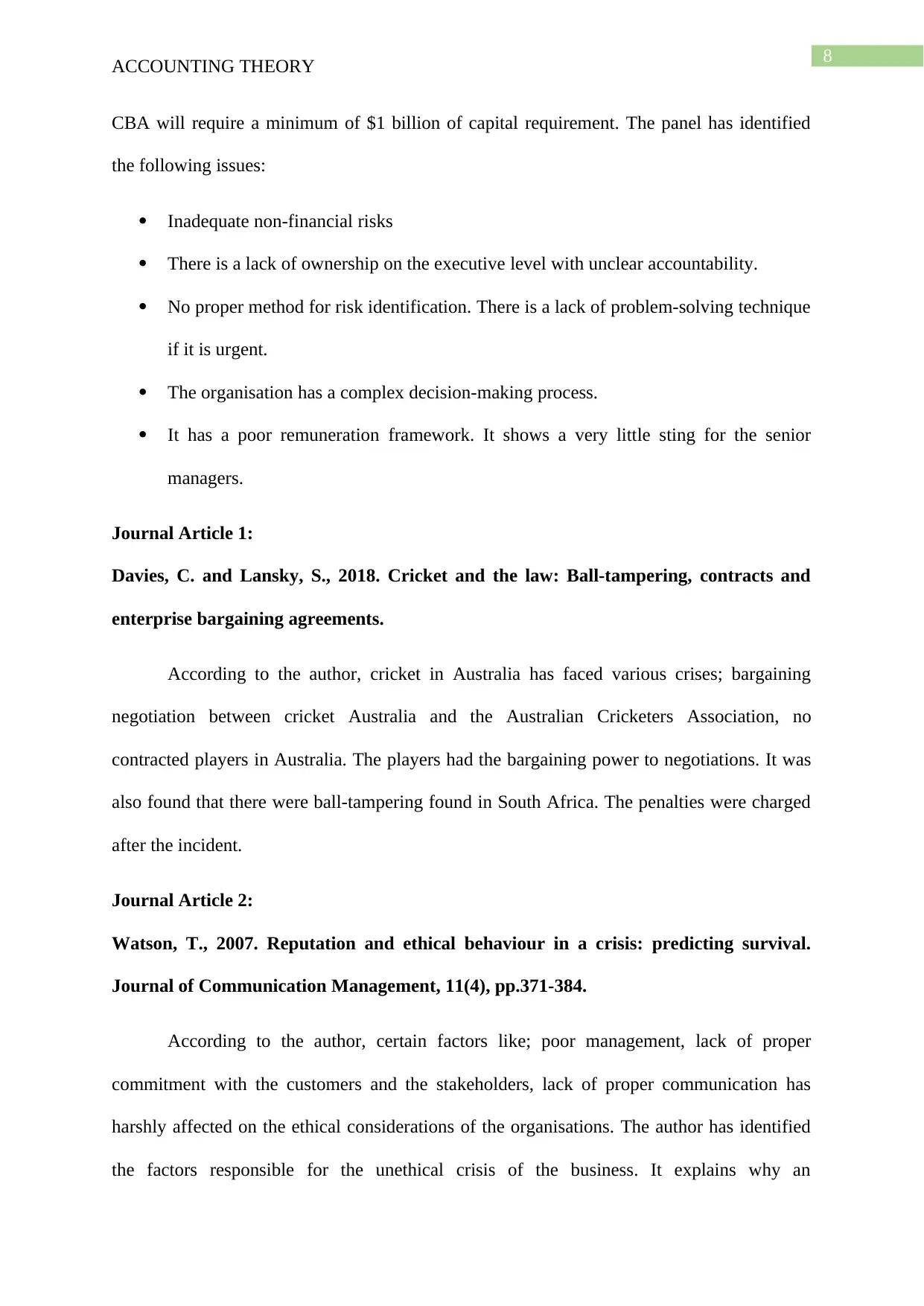
8
ACCOUNTING THEORY
CBA will require a minimum of $1 billion of capital requirement. The panel has identified
the following issues:
Inadequate non-financial risks
There is a lack of ownership on the executive level with unclear accountability.
No proper method for risk identification. There is a lack of problem-solving technique
if it is urgent.
The organisation has a complex decision-making process.
It has a poor remuneration framework. It shows a very little sting for the senior
managers.
Journal Article 1:
Davies, C. and Lansky, S., 2018. Cricket and the law: Ball-tampering, contracts and
enterprise bargaining agreements.
According to the author, cricket in Australia has faced various crises; bargaining
negotiation between cricket Australia and the Australian Cricketers Association, no
contracted players in Australia. The players had the bargaining power to negotiations. It was
also found that there were ball-tampering found in South Africa. The penalties were charged
after the incident.
Journal Article 2:
Watson, T., 2007. Reputation and ethical behaviour in a crisis: predicting survival.
Journal of Communication Management, 11(4), pp.371-384.
According to the author, certain factors like; poor management, lack of proper
commitment with the customers and the stakeholders, lack of proper communication has
harshly affected on the ethical considerations of the organisations. The author has identified
the factors responsible for the unethical crisis of the business. It explains why an
ACCOUNTING THEORY
CBA will require a minimum of $1 billion of capital requirement. The panel has identified
the following issues:
Inadequate non-financial risks
There is a lack of ownership on the executive level with unclear accountability.
No proper method for risk identification. There is a lack of problem-solving technique
if it is urgent.
The organisation has a complex decision-making process.
It has a poor remuneration framework. It shows a very little sting for the senior
managers.
Journal Article 1:
Davies, C. and Lansky, S., 2018. Cricket and the law: Ball-tampering, contracts and
enterprise bargaining agreements.
According to the author, cricket in Australia has faced various crises; bargaining
negotiation between cricket Australia and the Australian Cricketers Association, no
contracted players in Australia. The players had the bargaining power to negotiations. It was
also found that there were ball-tampering found in South Africa. The penalties were charged
after the incident.
Journal Article 2:
Watson, T., 2007. Reputation and ethical behaviour in a crisis: predicting survival.
Journal of Communication Management, 11(4), pp.371-384.
According to the author, certain factors like; poor management, lack of proper
commitment with the customers and the stakeholders, lack of proper communication has
harshly affected on the ethical considerations of the organisations. The author has identified
the factors responsible for the unethical crisis of the business. It explains why an
⊘ This is a preview!⊘
Do you want full access?
Subscribe today to unlock all pages.

Trusted by 1+ million students worldwide
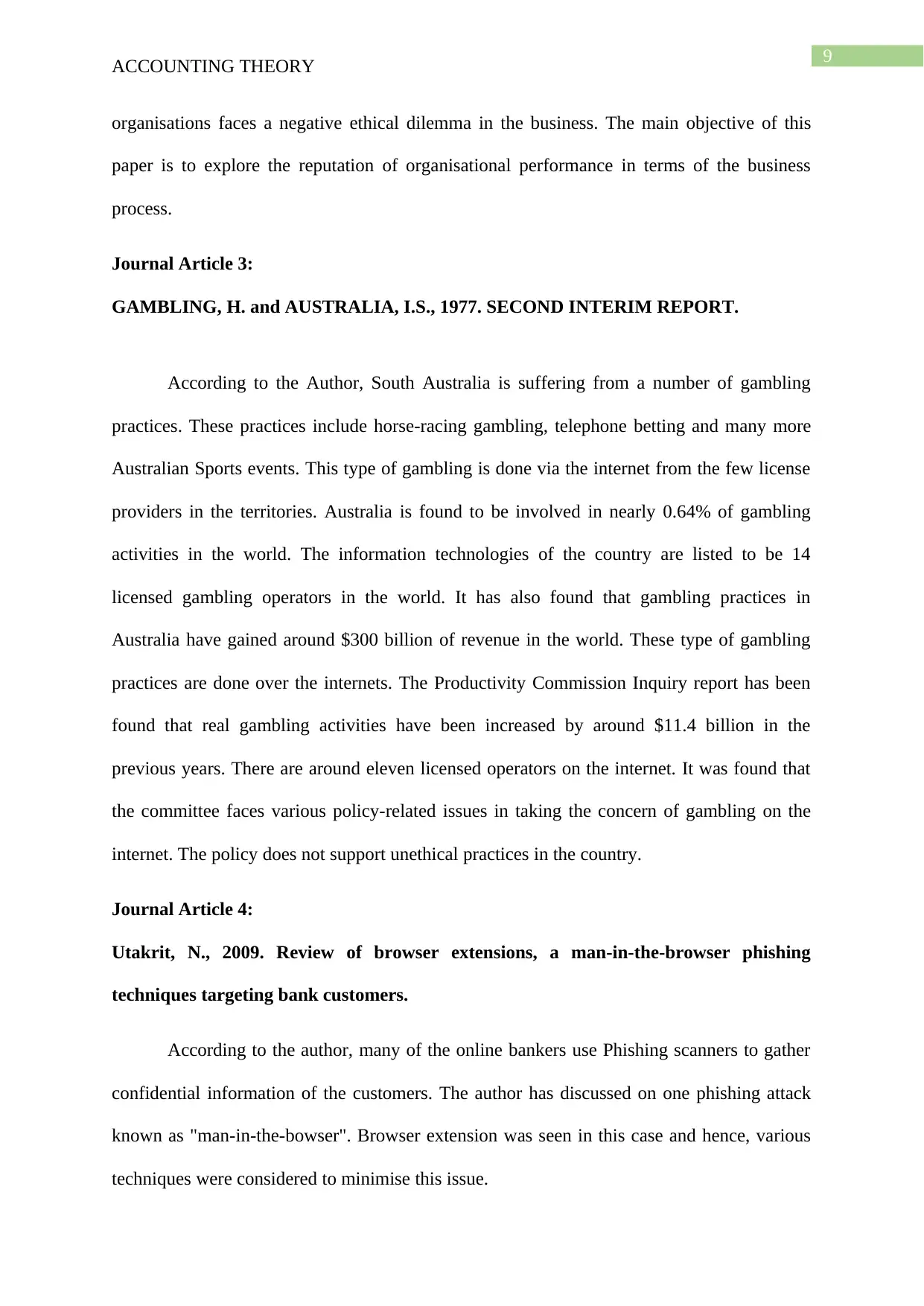
9
ACCOUNTING THEORY
organisations faces a negative ethical dilemma in the business. The main objective of this
paper is to explore the reputation of organisational performance in terms of the business
process.
Journal Article 3:
GAMBLING, H. and AUSTRALIA, I.S., 1977. SECOND INTERIM REPORT.
According to the Author, South Australia is suffering from a number of gambling
practices. These practices include horse-racing gambling, telephone betting and many more
Australian Sports events. This type of gambling is done via the internet from the few license
providers in the territories. Australia is found to be involved in nearly 0.64% of gambling
activities in the world. The information technologies of the country are listed to be 14
licensed gambling operators in the world. It has also found that gambling practices in
Australia have gained around $300 billion of revenue in the world. These type of gambling
practices are done over the internets. The Productivity Commission Inquiry report has been
found that real gambling activities have been increased by around $11.4 billion in the
previous years. There are around eleven licensed operators on the internet. It was found that
the committee faces various policy-related issues in taking the concern of gambling on the
internet. The policy does not support unethical practices in the country.
Journal Article 4:
Utakrit, N., 2009. Review of browser extensions, a man-in-the-browser phishing
techniques targeting bank customers.
According to the author, many of the online bankers use Phishing scanners to gather
confidential information of the customers. The author has discussed on one phishing attack
known as "man-in-the-bowser". Browser extension was seen in this case and hence, various
techniques were considered to minimise this issue.
ACCOUNTING THEORY
organisations faces a negative ethical dilemma in the business. The main objective of this
paper is to explore the reputation of organisational performance in terms of the business
process.
Journal Article 3:
GAMBLING, H. and AUSTRALIA, I.S., 1977. SECOND INTERIM REPORT.
According to the Author, South Australia is suffering from a number of gambling
practices. These practices include horse-racing gambling, telephone betting and many more
Australian Sports events. This type of gambling is done via the internet from the few license
providers in the territories. Australia is found to be involved in nearly 0.64% of gambling
activities in the world. The information technologies of the country are listed to be 14
licensed gambling operators in the world. It has also found that gambling practices in
Australia have gained around $300 billion of revenue in the world. These type of gambling
practices are done over the internets. The Productivity Commission Inquiry report has been
found that real gambling activities have been increased by around $11.4 billion in the
previous years. There are around eleven licensed operators on the internet. It was found that
the committee faces various policy-related issues in taking the concern of gambling on the
internet. The policy does not support unethical practices in the country.
Journal Article 4:
Utakrit, N., 2009. Review of browser extensions, a man-in-the-browser phishing
techniques targeting bank customers.
According to the author, many of the online bankers use Phishing scanners to gather
confidential information of the customers. The author has discussed on one phishing attack
known as "man-in-the-bowser". Browser extension was seen in this case and hence, various
techniques were considered to minimise this issue.
Paraphrase This Document
Need a fresh take? Get an instant paraphrase of this document with our AI Paraphraser
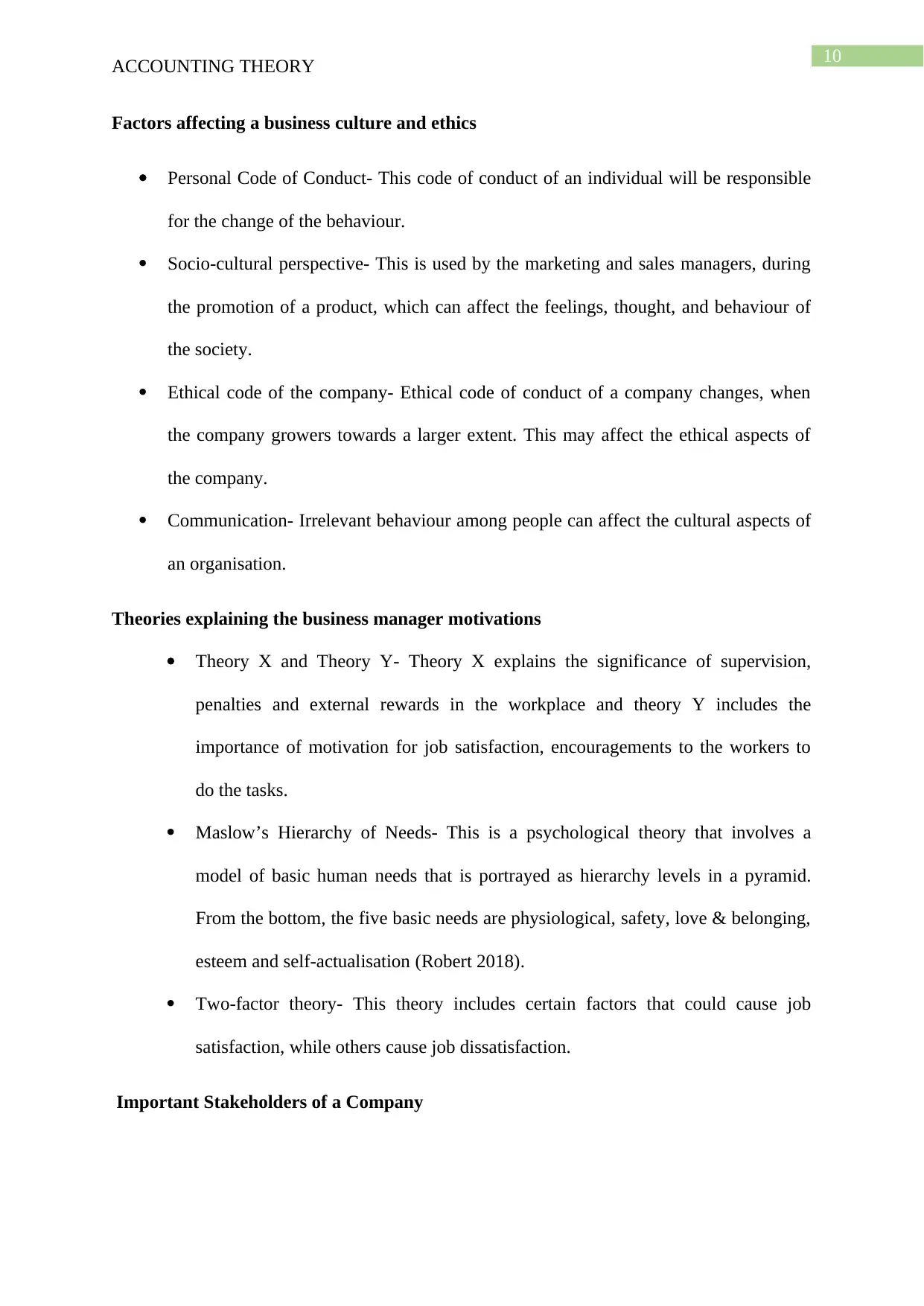
10
ACCOUNTING THEORY
Factors affecting a business culture and ethics
Personal Code of Conduct- This code of conduct of an individual will be responsible
for the change of the behaviour.
Socio-cultural perspective- This is used by the marketing and sales managers, during
the promotion of a product, which can affect the feelings, thought, and behaviour of
the society.
Ethical code of the company- Ethical code of conduct of a company changes, when
the company growers towards a larger extent. This may affect the ethical aspects of
the company.
Communication- Irrelevant behaviour among people can affect the cultural aspects of
an organisation.
Theories explaining the business manager motivations
Theory X and Theory Y- Theory X explains the significance of supervision,
penalties and external rewards in the workplace and theory Y includes the
importance of motivation for job satisfaction, encouragements to the workers to
do the tasks.
Maslow’s Hierarchy of Needs- This is a psychological theory that involves a
model of basic human needs that is portrayed as hierarchy levels in a pyramid.
From the bottom, the five basic needs are physiological, safety, love & belonging,
esteem and self-actualisation (Robert 2018).
Two-factor theory- This theory includes certain factors that could cause job
satisfaction, while others cause job dissatisfaction.
Important Stakeholders of a Company
ACCOUNTING THEORY
Factors affecting a business culture and ethics
Personal Code of Conduct- This code of conduct of an individual will be responsible
for the change of the behaviour.
Socio-cultural perspective- This is used by the marketing and sales managers, during
the promotion of a product, which can affect the feelings, thought, and behaviour of
the society.
Ethical code of the company- Ethical code of conduct of a company changes, when
the company growers towards a larger extent. This may affect the ethical aspects of
the company.
Communication- Irrelevant behaviour among people can affect the cultural aspects of
an organisation.
Theories explaining the business manager motivations
Theory X and Theory Y- Theory X explains the significance of supervision,
penalties and external rewards in the workplace and theory Y includes the
importance of motivation for job satisfaction, encouragements to the workers to
do the tasks.
Maslow’s Hierarchy of Needs- This is a psychological theory that involves a
model of basic human needs that is portrayed as hierarchy levels in a pyramid.
From the bottom, the five basic needs are physiological, safety, love & belonging,
esteem and self-actualisation (Robert 2018).
Two-factor theory- This theory includes certain factors that could cause job
satisfaction, while others cause job dissatisfaction.
Important Stakeholders of a Company
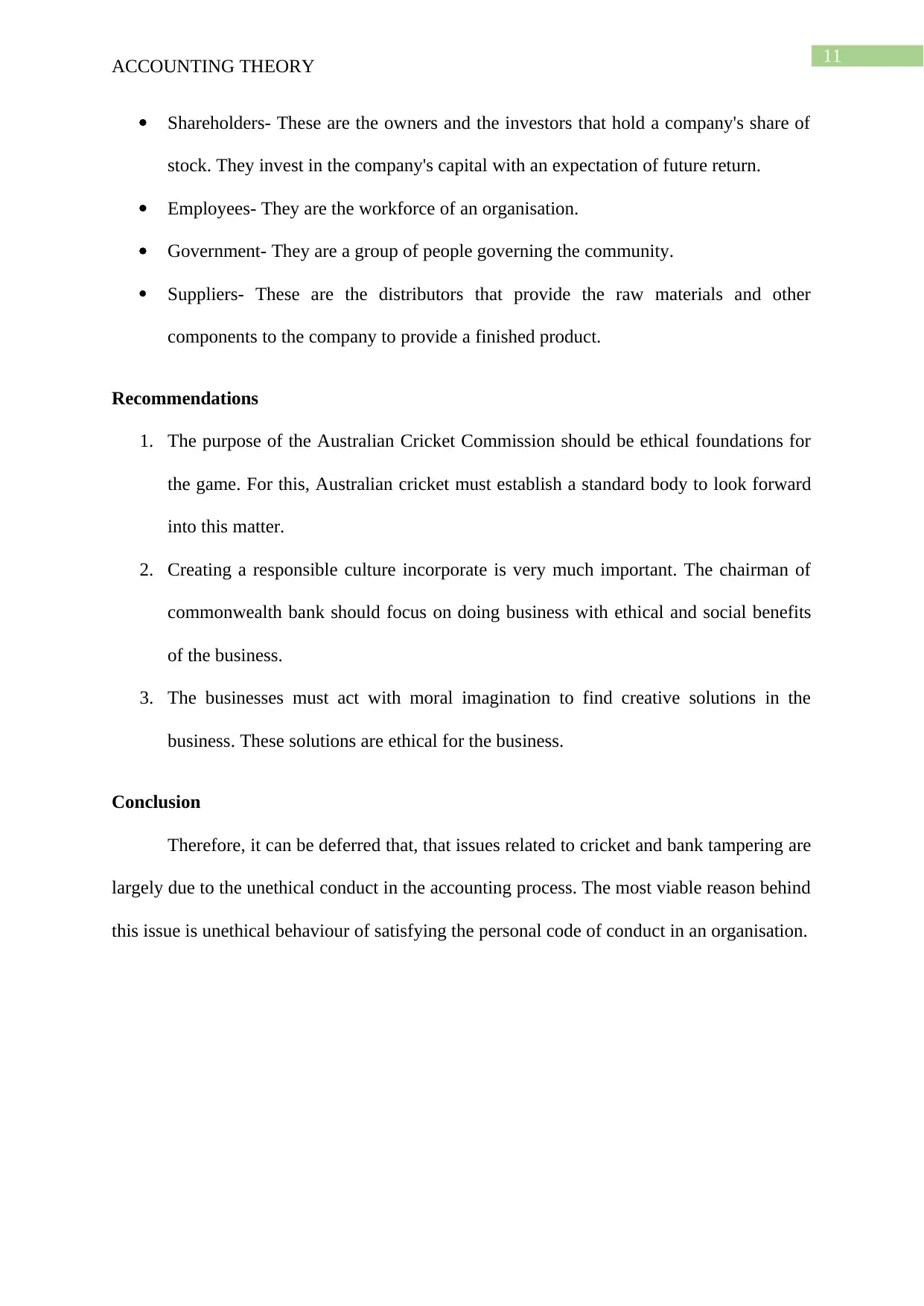
11
ACCOUNTING THEORY
Shareholders- These are the owners and the investors that hold a company's share of
stock. They invest in the company's capital with an expectation of future return.
Employees- They are the workforce of an organisation.
Government- They are a group of people governing the community.
Suppliers- These are the distributors that provide the raw materials and other
components to the company to provide a finished product.
Recommendations
1. The purpose of the Australian Cricket Commission should be ethical foundations for
the game. For this, Australian cricket must establish a standard body to look forward
into this matter.
2. Creating a responsible culture incorporate is very much important. The chairman of
commonwealth bank should focus on doing business with ethical and social benefits
of the business.
3. The businesses must act with moral imagination to find creative solutions in the
business. These solutions are ethical for the business.
Conclusion
Therefore, it can be deferred that, that issues related to cricket and bank tampering are
largely due to the unethical conduct in the accounting process. The most viable reason behind
this issue is unethical behaviour of satisfying the personal code of conduct in an organisation.
ACCOUNTING THEORY
Shareholders- These are the owners and the investors that hold a company's share of
stock. They invest in the company's capital with an expectation of future return.
Employees- They are the workforce of an organisation.
Government- They are a group of people governing the community.
Suppliers- These are the distributors that provide the raw materials and other
components to the company to provide a finished product.
Recommendations
1. The purpose of the Australian Cricket Commission should be ethical foundations for
the game. For this, Australian cricket must establish a standard body to look forward
into this matter.
2. Creating a responsible culture incorporate is very much important. The chairman of
commonwealth bank should focus on doing business with ethical and social benefits
of the business.
3. The businesses must act with moral imagination to find creative solutions in the
business. These solutions are ethical for the business.
Conclusion
Therefore, it can be deferred that, that issues related to cricket and bank tampering are
largely due to the unethical conduct in the accounting process. The most viable reason behind
this issue is unethical behaviour of satisfying the personal code of conduct in an organisation.
⊘ This is a preview!⊘
Do you want full access?
Subscribe today to unlock all pages.

Trusted by 1+ million students worldwide
1 out of 13
Related Documents
Your All-in-One AI-Powered Toolkit for Academic Success.
+13062052269
info@desklib.com
Available 24*7 on WhatsApp / Email
![[object Object]](/_next/static/media/star-bottom.7253800d.svg)
Unlock your academic potential
Copyright © 2020–2026 A2Z Services. All Rights Reserved. Developed and managed by ZUCOL.





